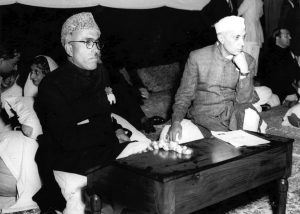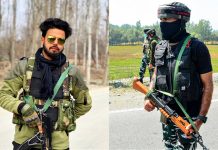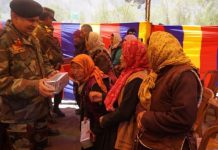 Birth anniversary of National Conference (NC) founder Sheikh Mohammad Abdullah on December 6 used to be a grand affair in J&K. A gazetted holiday, the anniversary celebrations would be attended by his son Dr Farooq Abdullah, president of the NC, and the grandson Omar Abdullah. The leaders would visit the mausoleum of Abdullah on the banks of Dal Lake, offer prayers, give a speech and raise slogans.
Birth anniversary of National Conference (NC) founder Sheikh Mohammad Abdullah on December 6 used to be a grand affair in J&K. A gazetted holiday, the anniversary celebrations would be attended by his son Dr Farooq Abdullah, president of the NC, and the grandson Omar Abdullah. The leaders would visit the mausoleum of Abdullah on the banks of Dal Lake, offer prayers, give a speech and raise slogans.
But on Abdullah’s anniversary this year, fewer NC workers turned up. They limited their presence to offering prayers only. Only major leader at the site was the party’s MP Hasnain Masoodi. The police had drawn concertina wires around the mausoleum to deter a large gathering of people.
This is for the first time since Abdullah’s death in 1982 that his birth anniversary and also his death anniversary on September 8 went unattended by the party’s senior leaders, all of whom are under detention since nullification of Article 370 on August 5.
The party also held a function at its headquarters at Nawa-i-Subah. However, only a few workers and party leaders, including MP from north Kashmir Akbar Lone, attended. The leaders made no political statements and restricted themselves to paying tributes to Abdullah.
The modest nature of the anniversary function was yet again indicative of the drastic thinning out of the political activities in Kashmir Valley since New Delhi August 5 move. All major Kashmir-based parties with a pan-J&K presence like the NC and the PDP have been forced out of the UT’s political landscape. And for that matter even the activities of Congress party have come to a stop.
But it is the NC and the PDP and the smaller party like People’s Conference which matter more in Kashmir Valley. Though their workers are free, the parties have chosen not to engage in any political activity or raise a voice against the loss of J&K’s special status under the constitution. The parties are keeping their cards close to their chest.
And with the centre indicating no immediate release of the leaders of these parties which include three former Chief Ministers — Farooq Abdullah, Omar Abdullah and Mehbooba Mufti — there is no telling what will be the future course of action of these parties.
For now, the party leaders who are free are not willing to say anything on record. “We are waiting for the release of our leadership, then only shall we be able to chart a future course of action,” says the MP Hasnain Masoodi. “We are also hoping the Supreme Court to overturn the August 5 move. It is an illegal and unconstitutional move”.
When asked that the court proceedings on Article 370 can drag on for decades, Masoodi said that his party had faith in the Supreme court. “We expect the Supreme Court to be alive to the sensitivity of the matter and ask the government to put the revocation of Article 370 on hold,” Masoodi said. “We also expect the government to put its decision on hold because of constitutional propriety. When the Apex court of the country decides to examine the constitutional validity of a government move, the government should stay the implementation of the move to let the court first decide”.
The MP also said that his party will also carry out a political struggle but its contours were yet to be decided. “Our case is ethical, moral, constitutional and historical. All options within framework of law, within framework of constitution will be exercised,” Masoodi said. “What we essentially demand is the supremacy of Indian Constitution”.
Similarly, the PDP is also waiting for the freedom of its president Mehbooba Mufti before it decides how to politically resist revocation of Article 370. Until then there is a huge suspense over how Kashmir situation will evolve in near to medium term.
letters@tehelka.com











